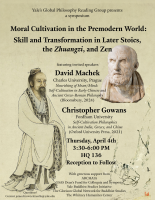Taylor and Francis Online are happy to announce that they have published a new issue of Asian Philosophy, 34:2. Please read below for a table of contents.
KU Leuven Conference: “The Other” Zheng Ming 正名
Please see here for information on a conference to be held next week at KU Leuven on “The Other” Zheng Ming 正名.
CFP: Conference on Ming 命
Please see here for information about an International Conference at Ghent University, Belgium (16-18 December 2024) on “Ming 命 as life-conditioning force and as malleable fate: Perspectives from old(er) age”. The deadline for submission of abstracts is 20 June.
State of the Field(s)?
The university I have taught at for thirty years (!) does not have PhD programs (except in sciences and music, for various historical reasons). Over the years, though, I have been asked to serve as an external member on PhD committees of, or even co-supervise, quite a number of students whose home department did not have sufficient expertise in their desired area of research. Since 2004, 18 such folks have successfully defended their dissertations, and I thought it might possibly be interesting to share the range of disciplines:
-
Philosophy = 4
-
Political Theory = 6
-
Religion = 3
-
Asian Studies / Chinese = 5
To some degree, of course, this is going to reflect my idiosyncratic interests. But I found myself wondering if the breakdown here points to anything more general. Are fewer people studying topics related to Confucianism in philosophy departments than in political theory or Asian studies? Or are political theory programs less likely than others to be able to support a dissertation on a Confucian topic without external help? Or … but rather than continuing to speculate by myself, I thought I’d open this up to see whether you all out there have ideas.
On-Line Book Workshop on Kim, Confucian Constitutionalism
Elena Ziliotti has organized an online book symposium on Sungmoon Kim’s recent book Confucian Constitutionalism (OUP, 2023) by inviting several philosophers and political theorists. Please see
https://philevents.org/event/show/121478 for details and to RSVP. The event is Thursday, April 18 beginning at 2:30pm Amsterdam time.
In-Person Workshop: SFU Asian Philosophy

The Simon Fraser University Department of Philosophy is pleased to announce the SFU Asian Philosophy Workshop on April 27-28, 2024.
This year’s theme is Chinese Metaphysics and features talks by six scholars from around the world. For more information including updates about the schedule, please refer to the website.
Registration is not required but can be done by emailing here.
1st Carolina Conference on Chinese Thought
The 1st Carolina Conference on Chinese Thought will take place tomorrow, on April 6, at Appalachian State University. Please see here for all the details, and enjoy!
CFP: Proposed Journal of Social and Political Philosophy issue on Common Sense
In Eclipse of Reason (1947), Max Horkheimer provides a fundamental analysis of the ambivalences of the (Western) concept of reason and showcases what a dialectical understanding of reason could look like. The special issue of JSPP “Eclipse of Common Sense” proposes an analogous treatment of the concept of common sense. The issue will revisit the conceptual foundations and premises of common sense (analytical function); explore its ambivalent normative character (evaluative function); and suggest ways out of this impasse that are inherent (critical function). In a first step, authors will address from a conceptual and a historical perspective a series of parameters or intellectual constants at the core of the term’s conceptual content. Second, other papers will scrutinize the concept’s foundation for democratic societies and test the term’s political applicability by examining its emancipatory promises in regard to promoting core democratic values, e.g., inclusivity, plurality, and visibility. Third, some will draw attention to the dangers underlying every attempt to universalize the supposed qualities of a particular and contextually dependent, Western, type of common sense and extrapolate different ways to reconceptualize the term as well as different practices that help overcome it’s political-social shortcomings.
Anyone interested in submitting a paper dealing with an East Asian approach or approaches to common sense should contact Paul Patton prp@unsw.edu.au
Deadline for Submissions: December 31, 2024.

Moral Cultivation in the Premodern World: Craft and Transformation in Later Stoics, the Zhuangzi, and Zen
Yale’s Global Philosophy Reading Group warmly invites you to a symposium entitled Moral Cultivation in the Premodern World: Craft and Transformation in Later Stoics, the Zhuangzi, and Zen. The symposium will take place next Thursday, April 4th in HQ 136, from 3:30 to 6:00 PM, with a reception (food from House of Naan, Prosecco, and sparkling water) to follow. Please see the description, program, and abstracts below for more details. We hope to see you there!
If you know in advance that you’ll attend, please send a quick email to james.brown-kinsella@yale.edu so we can order enough food and drink for the reception.
OUP Highlights Korean Women Philosophers
This March, Oxford Universty Press is focused on ‘Women in the History of Philosophy’ and have made the following chapter Introduction | Korean Women Philosophers and the Ideal of a Female Sage: Essential Writings of Im Yungjidang and Gang Jeongildang | Oxford Academic (oup.com) free to read. Congrats to the editors/translators, P. J. Ivanhoe and Hwa Yeong Wang!

